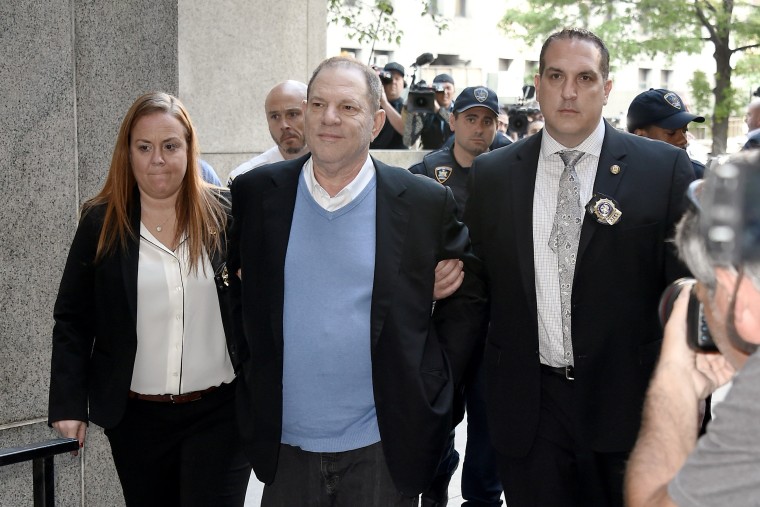On Friday, disgraced film mogul Harvey Weinstein appeared in a New York City court to face charges of rape and sexual assault, an event that brought with it a powerful feeling of catharsis for many of Weinstein’s victims. On "Good Morning America," accuser Rose McGowan (who is not a victim in the New York case) summed up a seeming collective reaction as she spoke about how the court date fulfilled “a visceral need for [Weinstein] to have handcuffs on.” After her TV appearance, McGowan took to Twitter to declare “We got you, Harvey Weinstein, we got you.”
Even for those who weren’t personally affected by Weinstein’s abuses, his appearance in court carried a certain symbolic weight. The New York Times piece that outed Weinstein as an allleged serial predator kicked off an entire movement dedicated to outing powerful abusers and holding them to account. Weinstein landing in front of a judge could be read as clear sign that the #MeToo movement has truly created cultural change — particularly when you consider that Weinstein’s court date occurred less than a month after Bill Cosby, another celebrity alleged serial predator, was found guilty of sexual assault.
It is important to remember that men like Harvey Weinstein are merely a symptom of an underlying disease, and not the disease itself.
Yet as thrilling as it is to see these once-powerful predators finally facing the justice system, it is important to remember that men like Harvey Weinstein are merely a symptom of an underlying disease, and not the disease itself. Weinstein may have been a stunning example of the extent to which abuse was allowed to occur within the Hollywood system — and his defense lawyer, after saying that the charges were "unsubstantiated" added "Mr. Weinstein did not invent the casting couch in Hollywood” — but Weinstein himself was not the ultimate origin of that abuse. However horrific Weinstein’s actions were, he was merely taking advantage of a toxic system that had long preceded him, one that profits off the debasement of women and normalizes abusive behavior at every turn.
And it's a system that largely still exist, even if one of its beneficiaries has been toppled.
You don’t have to look very far to get a sense of how widespread the conditions that enabled Weinstein’s abuses are. Earlier this month, New York’s former Attorney General Eric Schneiderman — a powerful advocate for women’s rights who’d brought a civil rights suit against Weinstein for his actions — was himself outed as an alleged serial abuser. The irony of a man who’d taken a strong stand against abuse being revealed to be an abuser himself was not lost on anyone: For many feminist advocates, Schneiderman’s abusive actions were a painful reminder that a public stance against abuse and assault can serve as a smokescreen for privately abusive behavior.
You don’t have to look very far to get a sense of how widespread the conditions that enabled Weinstein’s abuses are.
And though many of the predators who’ve been publicly accused in the months since Weinstein was outed have faced consequences — losing jobs, prestige, and public acclaim — others have come through their allegations largely unscathed. Matt Lauer, Charlie Rose and Louis CK have all been said to be planning their eventual returns to the spotlight. Jeffrey Tambor may have lost his role on "Transparent" after being accused of on-set harassment, but both Netflix and the cast of "Arrested Development" have chosen to stand behind him and very vocally express their support — even at the expense of the emotional wellbeing of fellow "Arrested Development" cast member Jessica Walter.
Then, for those who’ve been the victims of lesser-known abusers, whether things have changed can feel even murkier. Despite #MeToo’s powerful claim that abuse is a near-universal female experience (and it is an underreported male experience), our system has been reluctant to make any changes that would ease the process of reporting abuse and assault or bringing a perpetrator to justice. Women who report their rapes to the police still have to contend with uncaring officers who disbelieve and retraumatize them. Rape kits used to collect DNA evidence that can be used to convict perpetrators still go untested in much of the country. Most troublingly, women who manage to make it through the gauntlet of reporting to get their own day in court very rarely see their rapists convicted and sentenced.
It is far easier to single out and ostracize the most famous abusers among us than it is to truly contend with the abusive systems and behaviors in which we are all complicit.
A system that ignores the crimes of monstrous serial predators like Weinstein and Cosby is a system that fails to keep women safe. But a system that only holds men like Weinstein and Cosby accountable because their alleged crimes make international headlines is not much better. It is far easier to single out and ostracize the most famous abusers among us than it is to truly contend with the abusive systems and behaviors in which we are all complicit. But until we learn to condemn abuse at all levels, we’ll never truly live in a society that protects the most vulnerable.
Lux Alptraum is a Development Producer for Fusion’s "Sex.Right.Now." and the author of "Faking It: The Lies Women Tell About Sex — And the Truths They Reveal," out in fall 2018 from Seal Press.
